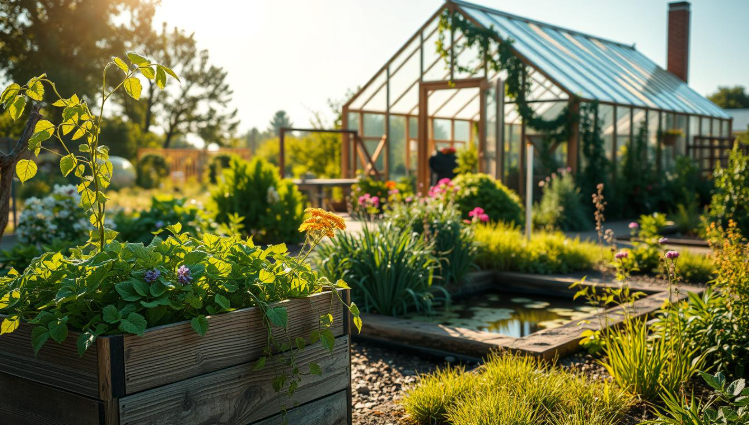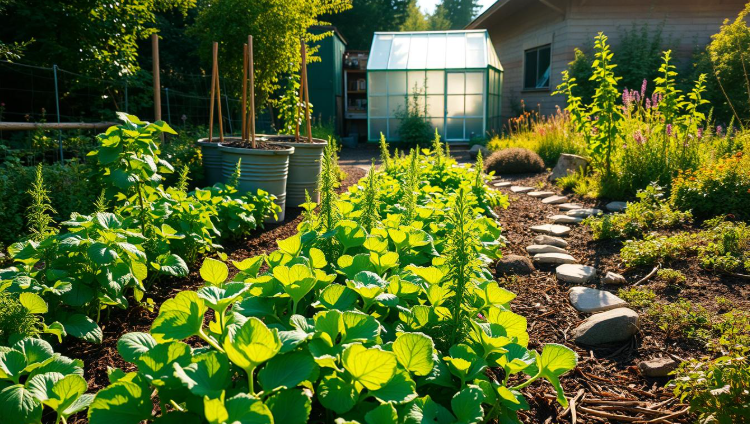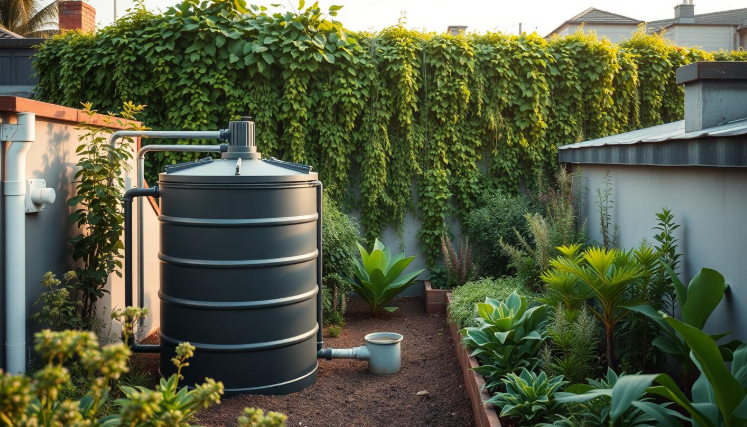Imagine stepping into a serene oasis, surrounded by lush plants and vibrant flowers. The air is fresh, and the atmosphere is tranquil.
This is not just a dream; it’s a reality that green gardening can bring to your doorstep.

By adopting sustainable practices, you can create a haven. This haven not only nurtures your well-being but also contributes to the health of our planet.
Eco-friendly gardening is more than just a trend. It’s a way to reconnect with nature and promote a healthier lifestyle.
Key Takeaways
- Create a sustainable oasis with eco-friendly gardening practices.
- Promote a healthier lifestyle by reconnecting with nature.
- Adopt sustainable gardening methods to contribute to the planet’s well-being.
- Nurture your well-being with a serene and tranquil green space.
- Make a positive impact on the environment with green gardening.
What is Green Gardening: A Sustainable Approach
Green gardening is more than just growing plants. It’s a way of life that cares for the environment. It focuses on using natural methods to grow your garden, reducing harm to nature.

The Philosophy Behind Eco-Conscious Gardening
The idea of green gardening is simple. It believes our garden actions can greatly impact the planet. By using eco-friendly methods, we help make the world a better place.
Eco-conscious gardening is more than a trend. It’s a move towards a greener future. By picking native plants and using organic methods, we can help the environment.
Environmental and Health Benefits for Indian Gardeners
In India, green gardening offers many benefits. It saves water, prevents soil loss, and supports many species. It also keeps families and pets safe from harmful chemicals.
Green gardening lets Indian gardeners enjoy a sustainable and healthy gardening experience. It makes gardens beautiful and helps the environment, leading to a greener future.
Essential Sustainable Practices for Your Garden
Sustainable gardening is more than just growing plants. It’s about living in harmony with nature. By using eco-friendly methods, gardeners help the environment and enjoy their garden’s benefits.
Creating a Composting System at Home
Composting is key in sustainable gardening. It turns waste into soil that’s full of nutrients. You need ‘green’ materials like kitchen scraps and ‘brown’ materials like dried leaves. A good compost pile cuts down on waste and makes soil better.

Organic Soil Management Techniques
Good soil management is vital for a sustainable garden. Use organic stuff like compost, manure, and green manure to make soil better. Stay away from synthetic fertilizers to keep soil healthy and protect water.
- Use compost to improve soil structure and fertility.
- Incorporate crop rotation to maintain soil health.
- Avoid tilling to minimize soil disturbance.
Choosing Native Plants for Indian Climate Zones
Picking plants native to your area is a smart move. Native plants need less water and care. For gardeners in India, choose plants that fit your climate zone.
Drought-Resistant Plants for Arid Regions
In dry areas, drought-resistant plants are best. Succulents like aloe vera and cacti need little water. They save water and make your garden look great.
Tropical Species for Humid Areas
Humid places are perfect for tropical species. Plants like orchids and bromeliads love the wet. They add color and texture to your garden.
By using these green practices, gardeners can make a garden that’s good for the planet and for themselves.
Water Conservation in Green Gardening
India’s varied climates need new ways to save water in gardening. This is key for living sustainably. By using less water, gardeners can keep their gardens green, even when water is scarce.
Rainwater Harvesting Systems for Indian Homes
Rainwater harvesting is a smart way to save water for gardening. Homeowners can set up systems to collect and store rainwater for dry times. This cuts down on groundwater use and helps municipal water supplies.
Key parts of a rainwater harvesting system are:
- Collection area: Usually, the roof is used.
- Conveyance system: Gutters and downspouts carry the rainwater.
- Storage tank: Holds the collected rainwater.

Efficient Irrigation Methods for Water Savings
Using water wisely is key to avoid waste. Gardeners can use several methods to give plants the right water without wasting it.
Drip Irrigation Systems
Drip irrigation sends water straight to the roots. This cuts down on evaporation and runoff. It’s very effective in places where water is scarce.
Wicking Beds for Consistent Moisture
Wicking beds keep plants moist by drawing water from a reservoir. They give plants water as they need it.
Mulching Techniques to Preserve Soil Moisture
Mulching helps keep soil moist. Adding organic mulch around plants stops soil evaporation and keeps it cooler.
Good mulching materials are:
- Organic straw
- Wood chips
- Leaves
By using these water-saving methods, Indian gardeners can help the planet. They also get to enjoy a beautiful garden.
Natural Pest Management for a Chemical-Free Garden
Using natural pest control is key for a chemical-free garden. It keeps your garden healthy and sustainable. It also makes the environment safer.
Choosing natural pest control methods avoids the dangers of chemical pesticides. These chemicals can harm soil, water, and air. Natural methods help the environment and keep the garden balanced.
Beneficial Insects in the Indian Ecosystem
India has many beneficial insects that fight garden pests. Ladybugs and lacewings eat aphids and whiteflies.
- Ladybugs eat aphids, keeping plants safe.
- Lacewings eat aphids, mites, and small insects.
- Praying mantis eat flies, bees, and butterflies.
By welcoming these insects, gardeners can control pests without chemicals.
Traditional Indian Remedies for Garden Pests
Indian traditions have many pest control methods. Neem oil is a popular natural pesticide.
- Neem oil stops insects from reproducing and kills them.
- Garlic spray keeps pests away and fights fungal diseases.
- Turmeric powder fights fungal diseases in plants.
These remedies are good for the environment and perfect for green gardening.
Strategic Companion Planting for Pest Control
Companion planting helps manage pests by planting different crops together. Some plants keep pests away or attract good insects.
- Marigold keeps nematodes, whiteflies, and pests away, great for tomatoes and veggies.
- Basil with tomatoes improves flavor and keeps aphids and mites off.
- Chives repel aphids and pests, good with roses and flowers.
Companion planting makes a garden diverse and less prone to pests.
Creating Green Gardens in Various Spaces
In urban India, space is often limited. This makes innovative gardening solutions key for a greener tomorrow. You can create a sustainable garden, no matter the size of your space.
Sustainable Balcony Makeover Projects
Turning your balcony into a garden can be simple or complex. The goal is to use space wisely and be kind to the environment.
Space-Efficient Container Gardening
Container gardening is a great starting point. It lets you grow many plants in small spaces. Make sure your containers drain well to avoid soggy soil.
Vertical Gardening Solutions for Urban Homes
Vertical gardening is perfect for small balconies. It saves space and adds beauty to your home. Start with a trellis or wall-mounted planter.
Eco-Friendly Landscaping Services in India
For bigger spaces, eco-friendly landscaping is a good choice. These services use native plants and organic methods. They also save water, which is good for the planet.
Community Garden Initiatives Across Indian Cities
Community gardens unite people and promote green gardening. Many cities have these gardens for growing food and flowers. Joining one is a great way to learn and share.
By using these gardening ideas, we can make our future greener, garden by garden.
Conclusion: Embracing the Green Gardening Lifestyle
Green gardening is more than just a hobby; it’s a way to improve our health and the planet’s. By using compost, organic soil, and rainwater, we can make our gardens beautiful and eco-friendly. This approach helps us grow healthy plants and supports a greener world.
Choosing green gardening means we care about our planet. It doesn’t matter if you’re turning your balcony into a garden or hiring landscaping services. Every action we take helps make our spaces better for the environment.
In India, as cities grow, green gardening becomes even more vital. By picking native plants, saving water, and controlling pests naturally, we can build sustainable gardens. Let’s work together to make our future gardens greener, one garden at a time.
FAQs
What are the key elements of green gardening?
Green gardening focuses on sustainable practices. This includes composting, organic soil care, and using water wisely. It also means choosing plants that fit your local climate.
How can I make my balcony more eco-friendly?
For an eco-friendly balcony, try a makeover. Use space-saving container gardens and vertical gardening. Pick plants that are native to your area and use smart watering systems
What are some effective water conservation methods for gardening?
To save water, use rainwater harvesting and drip irrigation. Mulching also helps keep the soil moist. These methods cut down on water waste.
How can I manage pests in my garden without using chemicals?
Manage pests naturally by using beneficial insects and traditional remedies. Companion planting is also effective. These methods protect the environment.
What are the benefits of using native plants in my garden?
Native plants need less water and care. They support local wildlife and are often pest-resistant. This makes them a great choice for your garden.
How can I get started with eco-friendly landscaping services?
Start by finding landscapers who focus on green gardening. They can help design a beautiful, eco-friendly garden for you.
What is the role of community garden initiatives in promoting green gardening?
Community gardens are key in promoting green gardening. They offer spaces for growing food and connecting with nature. They also help educate and engage communities in sustainable gardening.
